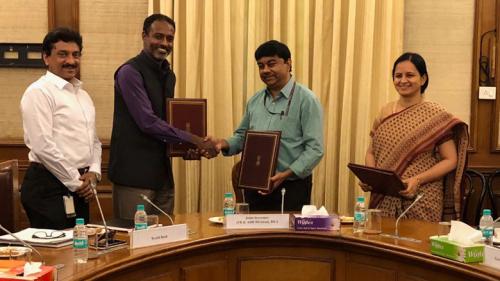Project Signing: Rajasthan to Strengthen its Fiscal Performance under new World Bank Project
The Government of India, the Government of Rajasthan and the World Bank , on May 29, signed a $21.7 million loan agreement for the Strengthening Public Financial Management in Rajasthan Project. With higher devolution of central funds to the states, the Project will help the state government put in place systems for better planning and budget management, enhance transparency, accountability, and efficiency in public spending, and strengthen the capacity of the revenue systems across key departments of Finance, Excise and Commercial Taxes Planning, and the Department of Information Technology, among others.

The agreement for the Project was signed by Sameer Kumar Khare, Joint Secretary, Department of Economic Affairs, Ministry of Finance (center), on behalf of the Government of India; Manju Rajpal, Secretary Finance (Budget), on behalf of the Government of Rajasthan (right); and Hisham Abdo, Acting Country Director, World Bank India, on behalf of the World Bank (left).
The agreement for the Project was signed by Sameer Kumar Khare, Joint Secretary, Department of Economic Affairs, Ministry of Finance, on behalf of the Government of India; Manju Rajpal, Secretary Finance (Budget), on behalf of the Government of Rajasthan; and Hisham Abdo, Acting Country Director, World Bank India, on behalf of the World Bank.
Rajasthan recognizes the need to strengthen both its expenditure and revenue sides, to address the rising requirements for higher development and social expenditure. The Project will help the departments put in place an architecture to strengthen Public Financial Management (PFM) rules, regulations & practices through modernized procurement arrangements; robust audit functions; better commitment management processes; leverage IT infrastructure to enhance use of latest technologies such as big data; and a more efficient tax assessment and audit procedure.
“Creating fiscal space for ensuring access to services is an important policy and management challenge for all states. Rajasthan has taken on this challenge with a commitment to finance high-quality health, education and social protection services for its citizens,” said Hisham Abdo, Acting Country Director, World Bank. “This Project will support the state improve the efficiency of expenditure and deliver on its agenda for sustained and inclusive growth.”
The state government is acutely aware of the need for higher efficiency in public expenditure and has already made progress in fiscal consolidation since the adoption of the Fiscal Responsibility and Budget Management Act (FRBM Act). The Integrated Financial Management System (IFMS) – a complete web-based solution for capturing government’s financial transactions including budget planning, preparation, allocation and distribution, fund management, treasury operations, and accounting is already functional.
The state has also enacted the Rajasthan Transparency in Public Procurement (RTPP) Act to regulate and strengthen procurement regulations. Another major initiative of the government was the introduction of the ‘Bhamashah’ scheme for efficient service delivery by enrolling women as the head of family.
“The Government of Rajasthan will now undertake the next generation reforms in the PFM sector many of which are niche and innovative reforms, being undertaken at sub-national level in India for the first time,” said Manju Rajpal, Secretary Finance (Budget), Government of Rajasthan.
The other key component of the Project includes supporting a modern e-government and IT system to increase the state’s own tax revenue through better compliance and data collection. Audit institutions in the state will be re-organized and re-oriented toward in-time and action-oriented reporting for ensuring better accountability of public spending. Recommendations on how to improve risk assessment in various areas will be identified to improve accountability. The Project will build the capacity of state government officials working for better cash and debt management including in cash flow forecasting.
“To realize the full potential of these reforms and achieving the states’ own priorities will require competent and efficient PFM systems in the state, coupled with greater transparency and accountability, said Manoj Jain, Lead Financial Management Specialist and World Bank’s Task Team Leader for the Project. “The PFM interventions under the Project will help build capacity to undertake activities that will improve the efficiency of expenditures and revenues and would likely alleviate the fiscal stress to a certain extent.”
The $21.70 million loan from the International Bank for Reconstruction and Development (IBRD), has a 6-year grace period, and a maturity of 14 years.
Source: World Bank
- 269 reads
Human Rights
Fostering a More Humane World: The 28th Eurasian Economic Summi

Conscience, Hope, and Action: Keys to Global Peace and Sustainability

Ringing FOWPAL’s Peace Bell for the World:Nobel Peace Prize Laureates’ Visions and Actions

Protecting the World’s Cultural Diversity for a Sustainable Future

Puppet Show I International Friendship Day 2020

